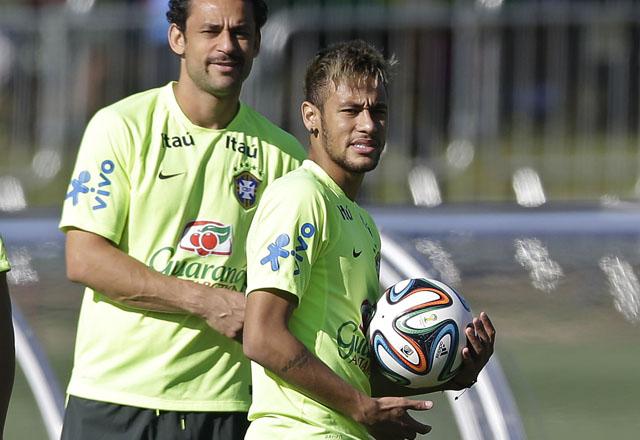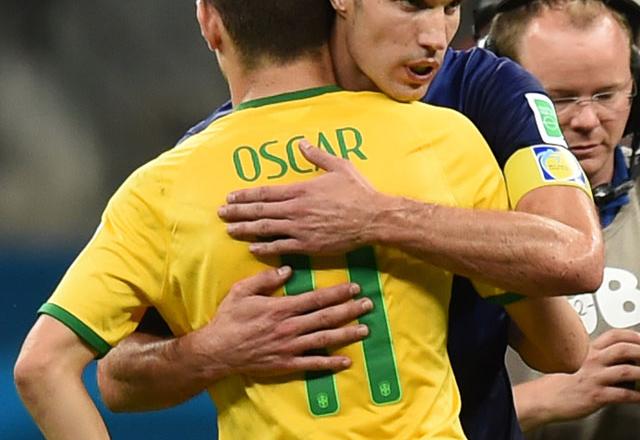You are here
Brazil rethinks future after World Cup failure
By AP - Jul 18,2014 - Last updated at Jul 18,2014
SAO PAULO — The World Cup held potential disaster for Brazil — the country, not the team.
Yet the country pulled off a magnificent tournament, albeit with a few bumps. It’s the team that has left many Brazilians wondering what went horribly wrong.
The Cup was widely seen as theirs for the taking, especially on home turf. They finished in fourth place with their star badly injured and the brutal memory of a 7-1 rout by the Germans in front of a global audience.
The most successful nation in World Cup history has been eliminated in three straight tournaments, enough to raise questions about whether it’s doing the right things to keep up with countries that have dominated the sport in recent years.
It’s already clear Brazil won’t be the same after the home tournament.
Luiz Felipe Scolari will not be returning, and new players will be joining Neymar and Oscar for the 2018 World Cup in Russia. Critics say bigger changers are needed, including in the local football confederation.
Scolari’s replacement was not immediately announced. Assistant Carlos Alberto Parreira, the coach who led Brazil to the 1994 World Cup title, was also leaving.
The resounding 7-1 loss to Germany, which embarrassed the nation, could become a turning point for the national team. The semifinal defeat has everyone thinking about the need to rebuild.
“We failed. We didn’t play up to expectations, we know it wasn’t a good tournament,” said striker Neymar, who missed the last two matches because of a back injury. “We didn’t play the kind of football that the Brazilian national team plays. It was just regular, and that’s why we still reached the semifinals, but it wasn’t Brazilian football, not the kind of football that enchants everybody.”
Brazil never displayed its traditional “Jogo Bonito”, or “Beautiful Game”, and ended the tournament with three wins, two draws and two losses, including 3-0 to the Netherlands in the third-place match on Saturday.
“Brazilian football has to evolve in general,” right back Dani Alves said. “We can’t discredit the work that has been done by this team, but we have to find a way to start restructuring our football from the youth levels up.”
Sports Minister Aldo Rebelo blamed some of Brazil’s failings on young players moving early to European clubs. He said parents were given jobs with clubs, and brought their children along.
“I have already denounced this,” Rebelo said Monday. “This is a type of football colonialism exercised by rich teams in Europe.”
The president of the Brazilian confederation, Jose Maria Marin, had said that losing the World Cup at home would be like “going to hell”.
“We need to think football differently,” said Brazilian coach Paulo Autuori, who led Sao Paulo to the Club World Cup title in 2005. “We need the Brazilian confederation in the hands of people from football. We need people in charge who can think football.”
Marin, a former politician, is leaving the confederation next year and will be replaced by Sao Paulo state federation president Marco Paulo Del Nero. Both were politically linked to Ricardo Teixeira, who ruled the confederation for more than 20 years before resigning in 2012 citing medical reasons and amid a cloud of allegations of corruption and irregularities in his administration.
Scolari was picked to lead the 2014 team mostly because of his popularity and experience from the 2002 title, but many critics said he was outdated as a coach. Before rejoining the national team, the coach was relegated in the Brazilian league with Palmeiras.
“We should thank him, but we need to choose new people with new thoughts about how to play the Brazilian way,” said former Brazil star Zico, who also blamed Brazil’s problems “on poor administration, a lack of structure and a vacuum of leadership.”
Scolari said Brazil is going through a period in which there are “fewer young promising players” in the country, and said that the confederation needs to “keep working” to make sure more appear in the future.
There are a few names already rumoured to be the next coach, including Tite and Muricy Ramalho, who have been successful with local clubs in recent years. Ramalho is a four-time Brazilian champion, while Tite led Corinthians to the Club World Cup title in 2012. There is also talk in local media about international coaches, including Pep Guardiola, Jose Mourinho and Chile’s Argentine coach Jorge Sampaoli.
Regardless of the new coach, many of the players will be changing.
Of the 23 players picked by Scolari for the home tournament, only seven will be younger than 30 in Russia — Neymar, Oscar, Marcelo, Luiz Gustavo, Paulinho, Willian and Bernard.
“It was disappointing in the end, but we have to remember that this generation has started a rebuilding process for 2018 with a fourth-place finish at the World Cup,” Scolari noted.
Neymar, who will be 26 in Russia, will still be carrying the hopes of the national team for a sixth world title.
“This will hurt for a long time, but we know that better days will come,” the 22-year-old striker said. “We have to do whatever possible to make sure we can make the Brazilian people happy again.”
Related Articles
SAO PAULO — The last time Brazil played a major football tournament at home, Neymar was stretchered off the field and then missed an embarra
The knockout stage of the World Cup begins Saturday with host Brazil playing Chile, the South American rival it has dominated over the years.
Brazilians already downhearted at missing out on reaching the World Cup final watched in dismay Saturday as their national team lost to the Netherlands 3-0 in the third-place match.

















